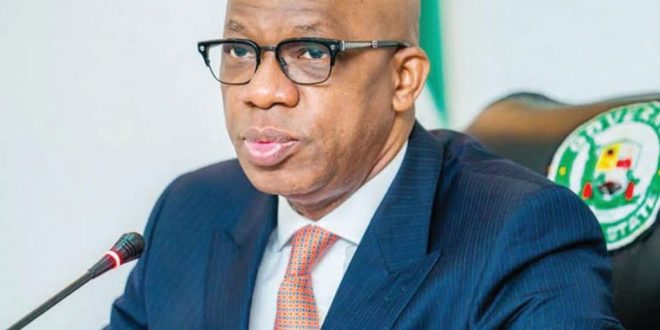Opinion:
By Elijah Udofia
When the Coronavirus hit the world early this year, nobody knew that the aftermath would be what Fela called, “sorrow tears and blood”. The pandemic did not only hold the world by the jugular, it dislocated the socio-economic and governance of so many countries.
In Nigeria, though the pandemic did not really cause so much havoc in terms of number of deaths, as against predictions, the social life and the economic activities of the people were adversely affected as the result of the numerous lockdowns and restriction of movements.
This health crisis led to the government at the national and State levels losing billions of Naira which would have been gotten through taxes, rates and other government revenue sources. The dislocation did not just come with its problems, but tones of problems and the outcome is still plaguing the country.
It should be noted that the first case of the pandemic in Nigeria was recorded in Ogun State, when a Liberian, consulting for a multinational company located in the State tested positive to the Virus. From then on, the State government in its efforts to contain the disease from spreading among its people, diverse various methods, including setting up isolation centres in different parts of the state and acquiring medical equipment like Molecular and other laboratories, training and retraining of health personnel to handle the crisis and most importantly, giving Palliatives to thousands of vulnerable and the extremely poor households who were adversely affected by the pandemic.
Of course, the pandemic also affected the 2020 Budget of N449. 974bn, as all the assumptions underlying the Budget became unrealistic and unattainable. This necessitated the need to review the budget downward to N281B, which is a 38 percent decrease. After the review, it was expected that N114B would come from the Internally Generated Revenue (IGR) and N38B expected inflows from the Statutory Allocation and Value Added Tax. However, as at 31st of October 2020, actual total revenue was N92B, which represented 42 percent of the prorated revenue target.
For a government that prides itself as existing due to the benevolence of the people and whose sole responsibility is the welfare and well-being of the people, it was time to put the nasty experience of year 2020 behind it and come with strategies that would lead to the recovery of what has been lost. One of the ways of doing this is to think and come up with a budget that would boost the economy and allow people to achieve their aspirations.
Setting the ball rolling, the state Governor, Prince Dapo Abiodun, let no one in doubt of what to expect next year when on Wednesday, December 2, presented a proposed Budget of N339bn to the State House of Assembly for consideration.
Tagged “Budget of Recovery and Sustainability, Abiodun told the state lawmakers that the purpose of the budget was to address the problems that arose as the result of the Covid-19 Pandemic, the #EndSARS protests, the general disenchantment in the polity, the socio-economic yearnings of the people for good governance as well as the stringent calls in all societal sphere for a more representative democracy that speaks to the issues of economic growth, consistent progress and equitable quality of life.
Taking a quick look at the budget, it could be seen that it is N110.974 less than that of 2020. Government must have realized that it is very important to adhere to the advice of the former United States President, George Washington who said “we must consult our means, rather than our wishes”, and realized that it is better to have a realistic budget than have one that would be difficult to implement.
One important aspect of next year’s Budget is that emphasis is placed on capital expenditure which gulps N117bn or 52 percent of the total budget would while N162bn or 48 percent which would be used for recurrent expenditure. The import of this is that money would be made available for the execution of capital projects which inevitably would have a positive impact on the lives of the people.
Going through the sectoral allocation, which the Governor often refers to as ISEYA, government set aside N61bn for Infrastructure, Social welfare and well-being which includes health, housing, environment, physical planning, women affairs, among others, got N93bn, Education would have N58bn, Youth Empowerment N6bn, Agriculture got N15bn, while the sum of N106bn, was allocated to the Enablers.
Furthermore, Governor Abiodun informed that the sum of N12bn was also set aside for Stabilization Fund and N10bn for public Debt charges. The Medium Term Expenditure Framework (MTEF), according to the state helmsman, was adopted for the second year running (2021-2023) to achieve good practice in financial management, while for the first time in the history of the state, Medium Term Revenue Strategy (MTRS), a major shift in budget preparation process from focus on the expenditure to a greater emphasis on revenue driven model, was adopted.
Looking at how fund would be generated to finance the budget, Abiodun said N119bn would come from the Internally Generated Revenue (IGR), N59bn from statutory allocation, while the larger part of N142bn, and would be sourced from internal and external loans including grants and aids.
One would not be surprised if those who put together this year’s budget had stumbled on the words of James Lew who said, “Budget is not just a collection of numbers, but an expression of our values and aspirations”. The insistence on completion of existing projects, projects with revenue potential which is consistent with priorities articulated in the State Economic Development Strategy as well as projects that could enhance employment generation, was well thought out and this would ensure that the people get value for their money.
For a government whose commitment to a legacy of hope, financial stability and fiscal prudence is not in doubt, the administration commitment to a drastic reduction in the indiscriminately impact of poverty by strengthening all regulatory and institutional framework that are crucial to the preservation of the state’s rich cultural, financial and historical heritage, is a welcome development.
Kevin McCarthy is of the opinion that “budgets are blueprints and priorities”, while James Connelly said “budget affects everything”. No doubt the blueprints and priorities have been set and knowing fully well that the budget has a way of affecting everything, it is hoped that 2021 would help in the recovery efforts of the government, while sustaining the progress made so far.
*Udofia, is Head of Ogun State Governor’s Press Crew, Oke-Mosan, Abeokuta, Ogun State.
 Startrend International Magazine For Your Latest News And Entertainment Gists
Startrend International Magazine For Your Latest News And Entertainment Gists





